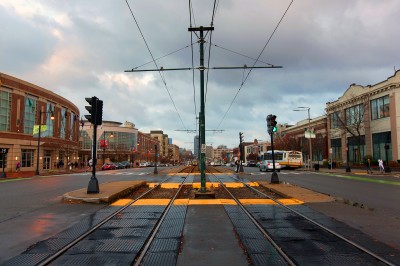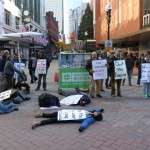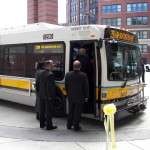
Six members of the Boston University community sent a letter to BU President Robert Brown, expressing concern with the City’s phase of construction plans on Commonwealth Avenue, rolled out at the end of the summer.
The City’s plans will narrow sidewalks on campus and widen Massachusetts Bay Transportation Authority tracks. According to the letter, the Phase 2A plans, which reach from Armory Street and spans to Alcorn Street just before Packard’s Corner, disregard the university’s goal to create a safer campus for bicyclists and pedestrians that is accessible to public transportation.
“As students, we learn that BU has a large part in this project,” said Matthew Danish, chair of the Reconstruction of Commonwealth Avenue committee for the BU Graduate and Professional Leadership Council and a signee of the letter. “We feel like this is a plan that BU is responsible for putting together, and we thought it would be a good idea to approach the president because this plan doesn’t serve faculty and student interests.”
Proposed improvements in the letter include installing cycle tracks for bicycle traffic, widening sidewalks to accommodate pedestrian traffic and decreasing public transportation congestion when accessing the MBTA, the letter stated.
“The main point is to have protective bicycle lanes and different lanes for the cars. That would really help make biking safer, as well as for cars and pedestrians,” said Johannes Schmieder, a professor of economics that signed the letter, in an email.
In stating that the current bicycling facilities designed by the City of Boston are inadequate and in need of attention, the letter pointed to a number of biker and pedestrian accidents that have occurred on BU’s campus, some of which have been fatal.
The letter also requested a meeting with Brown to discuss how the Comm. Ave. construction plan could be improved to accommodate safety for walkers, bikers and subway riders of the BU community.
Vice President of Government and Community Affairs Robert Donahue said Brown is aware of the letter. Because the university’s top priority is safety, he added, BU administrators will support the City in any efforts to improve biking along Comm. Ave.
“The University is involved in the planning efforts because safety is our major concern,” Donahue said in an email. “The bottom line is that it’s the City’s street and any designs should be submitted to them for evaluation. We trust [Deputy] Commissioner [of the Boston Transportation Department James] Gillooly to evaluate all alternatives and to design a safer and better boulevard.”
Authors of the letter are hoping to spread awareness through a rally about their safety concerns and proposed improvements for the construction plan and want BU to work with the City to field their concerns and make the needed improvements, Danish said.
“We feel that this is more in line with the university goal of increasing share of students and faculty members biking, walking or riding the T,” he said. “This is the best opportunity we will have. If it doesn’t happen now, no plans will occur on Commonwealth Ave. for another generation or two.”
Several students said the plan proposed to Brown in the letter could be beneficial to the BU community if incorporated into the City’s current plans.
Carolyn Phelan, a sophomore in Sargent College of Health and Rehabilitation Sciences, said BU has the potential to have a large involvement in the infrastructure of the city.
“It [the plan] would help those that choose to bike,” she said. “It would make bicyclists feel much safer on Commonwealth Avenue. BU is a huge part of the city.”
Chris Picher, a sophomore in the College of Communication, said the plan proposed by the letter would improve the safety of drivers as well.
“Since a mile and a half of Commonwealth Avenue is directly part of the BU campus, the new plan needs to include bikers and pedestrians while accommodating the needs of traffic flow,” he said.
Lauren LeBlanc, a sophomore in COM, said the plans laid out by the letter’s authors better accommodate students who bike and walk on campus.
“The student community would benefit because many of us don’t drive. It would be positive for students if the plan emphasized pedestrians and bicyclists of Boston University,” she said. “I hope that Boston University, in working with construction companies and the city people, can get to where they need to go safely.”





The rally for a safer Comm Ave, with cycle tracks, better sidewalks and calmed traffic speeds, will be held on Tuesday December 9th, 6:30 p.m. at Jacob Sleeper Auditorium (CGS 129) at 871 Comm Ave.